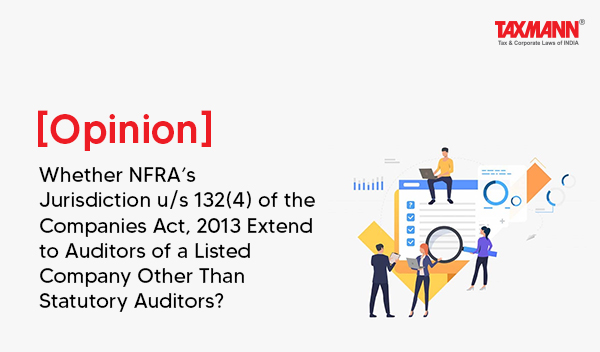[Opinion] Whether NFRA’s Jurisdiction u/s 132(4) of the Companies Act, 2013 Extend to Auditors of a Listed Company Other Than Statutory Auditors?
- Blog|News|Company Law|
- 3 Min Read
- By Taxmann
- |
- Last Updated on 9 January, 2024

Srinivasan Anand G. – [2024] 158 taxmann.com 179 (Article)
Background to the Controversy: NFRA’s recent Order 001/2024, Dated 03.01.2024
In its recent decision, the NFRA vide. Order No.001/2024, dated 03.01.2024, levied a ?50 Lakhs penalty on a Chartered Accountant for deficiencies in issuing a Form 10DA certificate to a listed company concerning its deduction claim under section 80JJAA of the Income-Tax Act, 1961. The NFRA took this action on information shared by the Director General of Income Tax (Investigation), Bengaluru (IT department). The NFRA Suo motu initiated action under Section 132(4) of the Companies Act 2013 (‘Act’ hereafter) to look into the professional conduct of the chartered accountants and their firms involved in the said certification. After its probe and hearing CA Pawan Jain, the NFRA held that CA failed to exercise due diligence and obtain sufficient information before issuing reports under the Income Tax Act. And consequently, NFRA imposed the fine on the CA.
NFRA has taken the view that its powers u/s 132(4) extends also to auditors appointed by a listed company under other Acts
This decision raises the question as to whether Section 132(4) of the Companies Act,2013 empowers the National Financial Reporting Authority (NFRA) to probe lapses of auditors of a listed company where they are appointed under provisions of an Act other than Companies Act,2013 to issue certificates under that Act?
For instance, can the NFRA initiate action against a CA/CA firm appointed to issue a certificate to a listed company in Form 10DA to enable the company to claim a deduction under section 80JJAA of the Income-Tax Act,1961?
NFRA has taken the view that its jurisdiction to probe Professional misconduct of CAs/CA firms not only extends to statutory auditors of listed companies appointed u/s 139 of the Companies Act,2013 but also to CAs/CA firms appointed by listed company to issue certificates under any other Act such as the Income-Tax Act,1961. In Para 6 of the Order, NFRA has held that
“NFRA is empowered under Section 132 (4) of the Act to investigate professional misconduct or other misconduct of individual members or firms of chartered accountants associated with prescribed classes of companies and sanction them where such misconduct is proved”.
The question does arise whether this view of NFRA is supported by section 132(4) and the NFRA Rules, 2018.
Provisions of Section 132(4)(a) of Companies Act, 2013
Section 132(4)(a) of the Companies Act,2013 reads as under:
(4) Notwithstanding anything contained in any other law for the time being in force, the National Financial Reporting Authority shall—
(a) have the power to investigate, either suo motu or on a reference made to it by the Central Government, for such class of bodies corporate or persons, in such manner as may be prescribed into the matters of professional or other misconduct committed by any member or firm of chartered accountants, registered under the Chartered Accountants Act, 1949 (38 of 1949):
In view of the words “for such class of bodies corporate or persons, in such manner, as may be prescribed”, the scope of NFRA’s power under section 132(4)(a) depends on the Rules notified under section 132(4)(a). The Central Government has notified the National Financial Reporting Authority Rules, 2018 (NFRA Rules,2018) under section 132(4).
Click Here To Read The Full Article
Disclaimer: The content/information published on the website is only for general information of the user and shall not be construed as legal advice. While the Taxmann has exercised reasonable efforts to ensure the veracity of information/content published, Taxmann shall be under no liability in any manner whatsoever for incorrect information, if any.

Taxmann Publications has a dedicated in-house Research & Editorial Team. This team consists of a team of Chartered Accountants, Company Secretaries, and Lawyers. This team works under the guidance and supervision of editor-in-chief Mr Rakesh Bhargava.
The Research and Editorial Team is responsible for developing reliable and accurate content for the readers. The team follows the six-sigma approach to achieve the benchmark of zero error in its publications and research platforms. The team ensures that the following publication guidelines are thoroughly followed while developing the content:
- The statutory material is obtained only from the authorized and reliable sources
- All the latest developments in the judicial and legislative fields are covered
- Prepare the analytical write-ups on current, controversial, and important issues to help the readers to understand the concept and its implications
- Every content published by Taxmann is complete, accurate and lucid
- All evidence-based statements are supported with proper reference to Section, Circular No., Notification No. or citations
- The golden rules of grammar, style and consistency are thoroughly followed
- Font and size that’s easy to read and remain consistent across all imprint and digital publications are applied



 CA | CS | CMA
CA | CS | CMA
